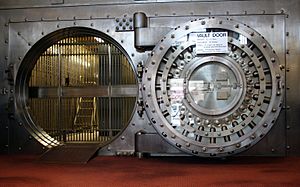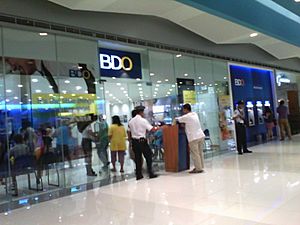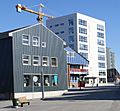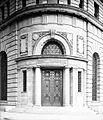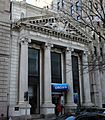Bank facts for kids
A bank is a special kind of company where people can keep their money safe or borrow money. Banks also use the money they have to invest in different things, which helps them earn more money. How banks operate is guided by rules set by the government, and these rules can be different in various countries. The people who work at a bank and manage its operations are called bankers.
Some banks work directly with everyday people, helping them with things like deposit accounts (where you put your money) or giving out loans. For example, if you want to buy a house, a bank might give you a mortgage, which is a type of loan you pay back over time with a little extra money called interest. Other banks focus on bigger financial deals, like investments or international currency trading.
In most countries, the government creates the rules for banks through special laws. There's often a central bank (like the Bank of England) that helps control how much money is available in the country. This is a big part of a country's economy, and the government makes important decisions about it. These central banks are also responsible for printing coins and banknotes.
Contents
The History of Banks
The word bank comes from the Italian word banco, which means a bench. This is because during the Renaissance in Italy, merchants would make deals to lend and borrow money while sitting beside a bench where they placed their money.
People have been keeping financial records for a very long time, even before writing was invented! Early records were sometimes made on baked clay.
In the 1600s, merchants in London started keeping their gold safe with goldsmiths. Goldsmiths had strong vaults and charged a small fee to store the gold. Over time, these goldsmiths began to lend out the gold that was stored with them. They even started paying interest to the merchants for keeping their gold there. This was an early form of banking.
The Bank of England started printing its own banknotes in 1695. The oldest bank that is still open today is Monte dei Paschi di Siena in Siena, Italy. It first opened its doors in 1472!
What Banks Do for You
Banks offer many helpful services to their customers:
- Checking accounts: These accounts let you easily put money in and take it out.
- Cheque books: You can use cheques to pay for things from your checking account.
- Savings accounts: These accounts are for saving money, and the bank usually pays you a small amount of interest for keeping your money there.
- Money market accounts: These are like savings accounts but often offer higher interest rates for larger amounts of money.
- Certificate of deposit (CD): You put money away for a set time, and the bank pays you a fixed amount of interest.
- Individual retirement account (IRA): These are special accounts to help people save money for when they retire.
- Credit cards: These cards let you borrow money from the bank to make purchases, which you then pay back later.
- Debit cards: These cards let you spend money directly from your checking account.
- Mortgages: These are large loans from the bank to help you buy a house or apartment.
- Mutual funds: These are ways to invest your money in a mix of different stocks or bonds.
- Personal loans: These are loans for personal use, like buying a car or paying for education.
- Time deposits: Similar to CDs, you deposit money for a fixed period and earn interest.
- Automated teller machines (ATMs): These machines let you get cash or check your balance without going inside the bank.
Different Kinds of Banks
There are several types of banks, each with a slightly different focus:
- Community development banks: These banks help people and businesses in specific areas that might not have many financial services.
- Land development banks (LDBs): These banks give out long-term loans, often to help with farming and improving land. The first LDB started in 1920 in Punjab.
- Credit unions or Co-operative banks: These are not-for-profit banks owned by their members (the people who deposit money there). They often offer better rates than regular banks. Usually, you need to be part of a certain group to join, like employees of a company or residents of an area.
- Postal savings: Some countries have banks connected to their national postal systems, where people can save money.
- Offshore banks: These banks are in places with low taxes and fewer rules. Many are private banks for wealthy individuals.
- Savings banks: These banks mainly focus on taking in savings deposits and paying interest on them.
- Building society and Landesbanks: These are institutions that offer everyday banking services to people.
- Direct or internet-only banks: These banks don't have physical branches. You do all your banking online using computers and the internet.
Images for kids
-
Sealing of the Bank of England Charter (1694), by Lady Jane Lindsay, 1905.
-
Interior of the Helsinki Branch of the Vyborg-Bank in the 1910s
-
Banco de Venezuela in Coro.
-
A former building society, now a modern retail bank in Leeds, West Yorkshire.
-
An interior of a branch of National Westminster Bank on Castle Street, Liverpool
-
OTP Bank in Prešov (Slovakia)
-
Global headquarters of the Bank for International Settlements in Basel
-
An illustration of Northern National Bank as advertised in a 1921 book highlighting the opportunities available in Toledo, Ohio
-
National Bank of the Republic, Salt Lake City 1908
-
The BANK of Greenland, Nuuk
-
ATM Al-Rajhi Bank
-
National Copper Bank, Salt Lake City 1911
-
A branch of Union Bank in, Visakhapatnam
-
A Banco do Brasil office in São Paulo, Brazil, the bank is the largest financial institution in Brazil and Latin America.
-
Citibank, The People's Trust Company Building, Brooklyn, New York City.
See also
 In Spanish: Banco para niños
In Spanish: Banco para niños
 | Precious Adams |
 | Lauren Anderson |
 | Janet Collins |


